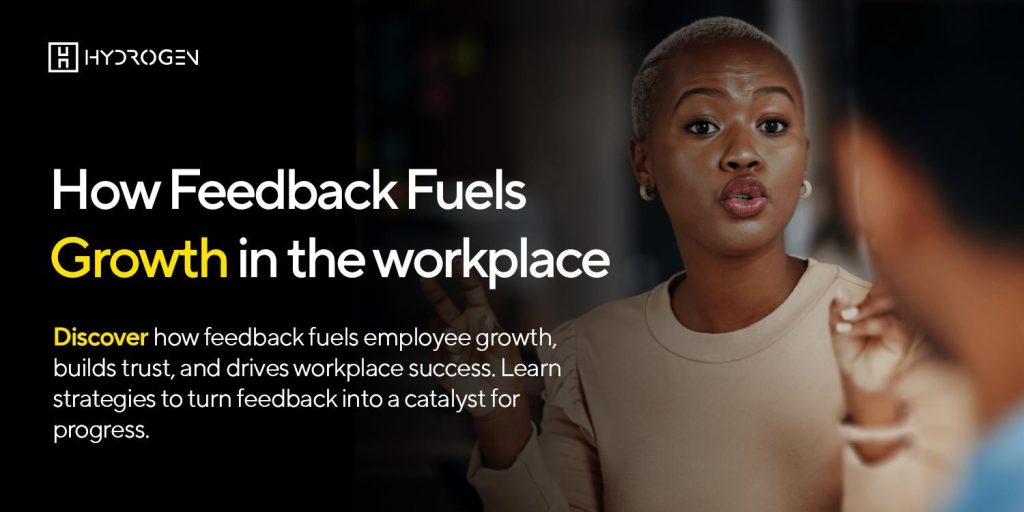How Feedback Fuels Growth in the Workplace

By Adeshola Adenike Aliogo, Head Human Resources, Hydrogen
Rethinking Feedback
Feedback often carries a negative perception. For many employees, the phrase “Can I give you some feedback?” signals criticism. For managers, giving it can feel like walking a tightrope between honesty and morale. Yet, despite its discomfort, feedback is one of the most powerful tools for growth at work.
Today’s workplace is shaped by rapid change. Technology is transforming industries, hybrid work is rewriting norms, and employees expect more from their organisations. In such an environment, feedback helps individuals and teams keep moving forward. It uncovers blind spots, accelerates learning, and builds the trust needed to thrive.
This article explains why feedback matters now and offers practical, human-centered tips for managers and teams who want a culture where feedback fuels growth instead of fear.
Why Feedback Matters More Than Ever

Feedback is no longer limited to performance reviews. It now plays a central role in adaptability and resilience. Roles evolve quickly, and market demands can shift overnight. The ability to learn and adjust in real time has become essential. Three reasons stand out:
- It closes blind spots. No one sees themselves fully. We all have habits or assumptions that shape how others experience us. Without feedback, blind spots remain hidden; with feedback they become visible and can be addressed (Harvard Business Review, 2019).
- It accelerates learning. Imagine a pilot learning to fly but only receiving feedback once a year. It would be disastrous. The workplace is no different. Timely, constructive feedback allows people to correct mistakes quickly and strengthen learning (SHRM, 2023).
- It builds trust and connection. Well-delivered feedback deepens relationships. It signals care: “I believe in you enough to tell you the truth.” Over time, this honesty builds psychological safety where people can exchange feedback without fear (APA, 2023).
For Managers: Turning Feedback into a Growth Engine
Managers shape how feedback is experienced. When handled poorly, feedback feels like judgment. When handled well, it feels like coaching. Managers can shift from “performance police” to “growth partners” by focusing on the following:
- Reframe the purpose. Approach feedback as a way to empower, not evaluate. Your role is to support people in becoming their best selves.
- Make feedback timely and frequent. Delayed feedback loses power. Waiting until quarterly or annual reviews often means the moment for learning has passed. Regular check-ins keep development real and actionable.
- Balance courage with care. Honesty is vital, but empathy shapes how it is received. Focus on behaviors rather than personality traits (Harvard Business Review, 2023).
- Recognize effort, not only outcomes. Growth is about progress as well as results. Recognising effort encourages persistence.
- Model receptivity. When managers ask for and act on feedback, they set the tone. Employees see feedback as part of the culture, not a one-way directive.
For Teams: Building a Feedback Mindset
Feedback should not flow only from the top down. Healthy workplaces encourage feedback sideways (peer-to-peer) and upward (from employees to leaders). Teams can strengthen their culture by adopting these practices:
- Ask for feedback, don’t just wait for it. Proactively invite perspectives that support growth.
- Separate behaviour from identity. Feedback is about what you do, not who you are.
- Practice active listening. Pause before responding. Focus on understanding, not defending.
- Normalize peer feedback. Colleagues who work closely with you often provide the most actionable insights (Frontiers in Psychology, 2021).
- Pay it forward. Treat feedback as a gift. If you receive it, pass it along to help others grow.
Practical Tips to Create a Feedback Culture

Building a feedback culture requires consistency and structure. These practical actions can help:
- Build rituals. Create regular spaces where feedback is expected, such as after-action reviews.
- Use the SBI model. Focus on the Situation, Behavior, and Impact to keep conversations clear and nonjudgmental.
- Make feedback two-sided. Every conversation should give both people a chance to share.
- Celebrate small wins. Balance constructive input with recognition to encourage confidence.
A strong feedback culture does not appear overnight. It grows through repeated actions that reinforce openness and trust (World Economic Forum, 2023).
Final Thought: Feedback as a Gift
Feedback does not have to be scary or uncomfortable. At its core, it is about growth and the belief that improvement matters. When managers deliver feedback with courage and care, and when teams embrace it with openness and curiosity, feedback shifts from being a dreaded event to being the everyday fuel for success.
Pause the next time you give or receive feedback. Do not see it as criticism. See it as a gift. A gift that, when unwrapped properly, can unlock the next level of growth for you and your team.
For more on people and culture at Hydrogen, read Our People, Our Strength — Hydrogen.
 Transacting at the speed of light
Transacting at the speed of light 